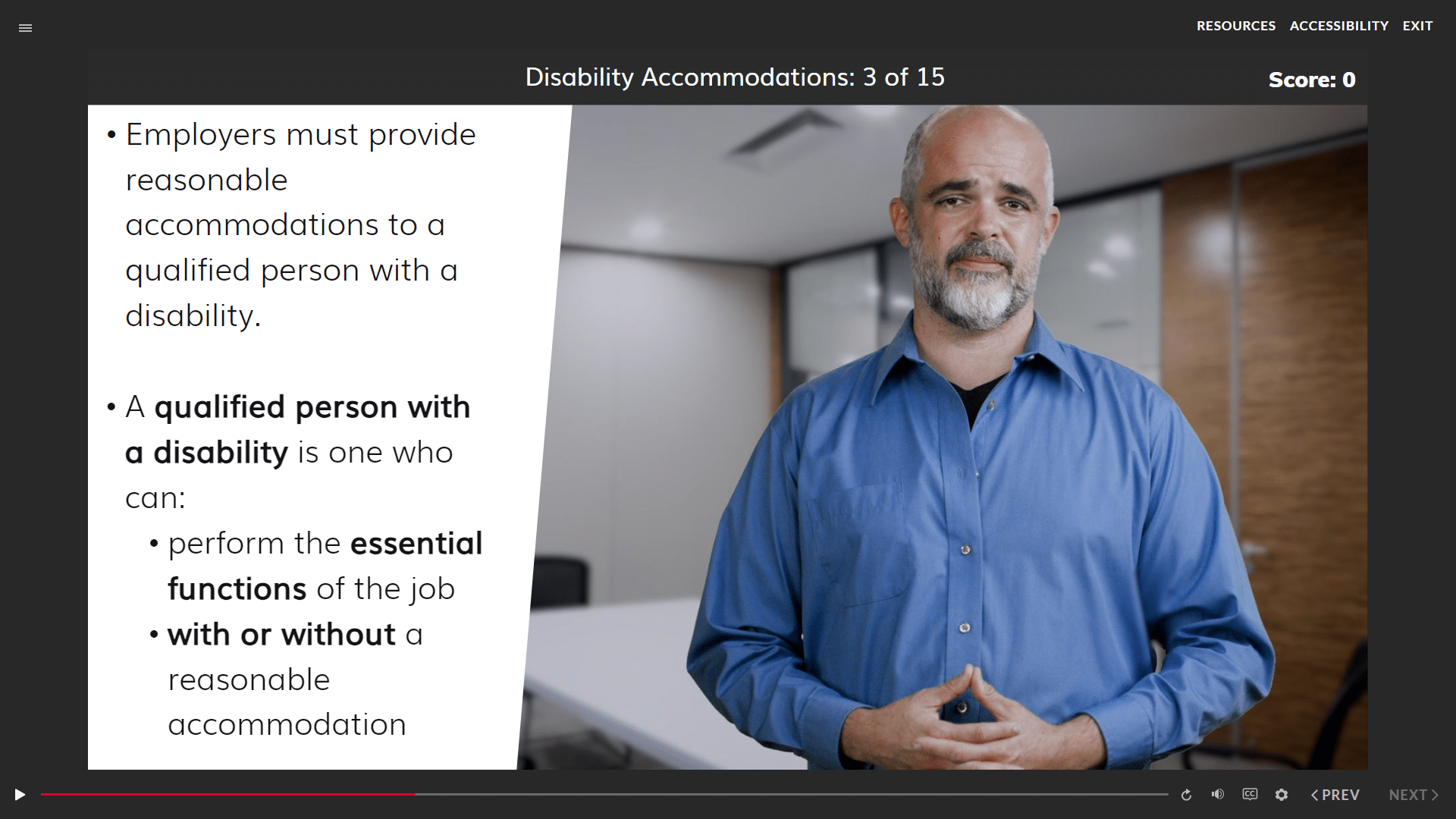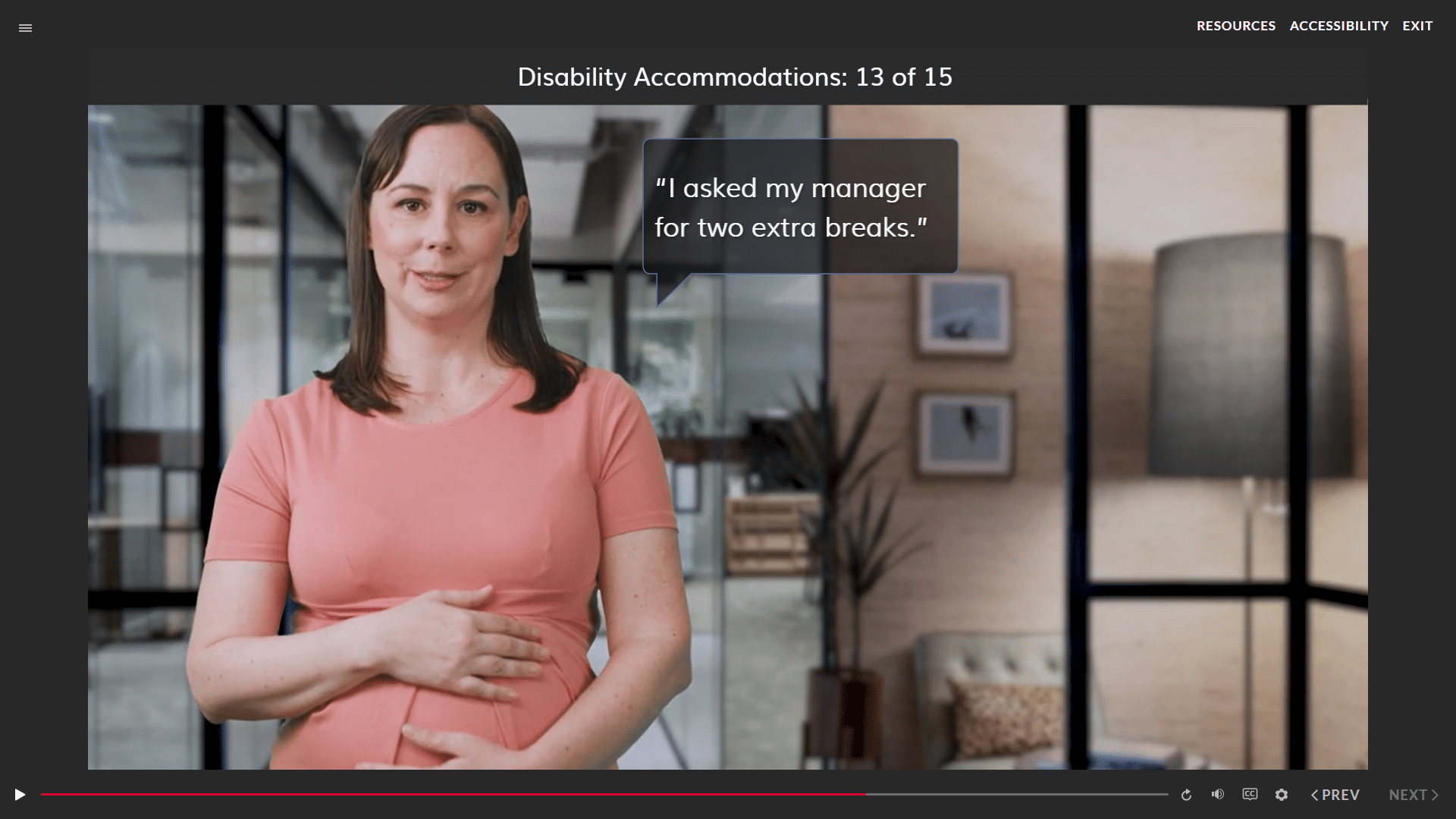
Disability, Pregnancy & Religious Accommodations
Understanding the different needs of your employees is essential to creating a welcoming and accommodating workplace.
Course description
Traliant’s Disability, Pregnancy, and Religious Accommodations is a 25-minute course that teaches employees how to comply with accommodations requirements under the ADA, PWFA, Title VII, similar state and local laws, and your organization’s policies. Managers learn about their special obligations for ensuring compliance with these laws. The course is kept up-to-date with changes in federal and state law.
ONLINE TRAINING
Disability, Pregnancy & Religious Accommodations

The course covers these topics and more:
- Steps managers should take when they learn of a request for a disability, pregnancy, or religious accommodation
- How must an employee request accommodation?
- What is a “qualified person with a disability” under the ADA?
- What is a “qualified employee” under the PWFA?
- Types of beliefs that may entitle an employee to a religious accommodation
- The disability, pregnancy and religious accommodation “interactive process”
- When can an employer require medical documentation of the need for a disability accommodation?
- “Undue hardship” under the ADA and for religious accommodations
- Common types of disability, pregnancy and religious accommodations
- Lactation accommodations that employers are required to provide
THE TRALIANT DIFFERENCE
Compliance you can trust.
Training you will love.

Legal expertise
Our in-house legal team monitors the latest laws, rules and regulations, so you don't have to. You can rest assured that our courses are continuously compliant.

Brilliant training
With cinematic-quality videos produced by our Hollywood-based team, your employees will love our customizable, interactive, story-based training.

Valued partnership
Our main focus? It’s all about making your job easier. We do that with unmatched responsiveness and seamless deployment, dedicated to driving your success.

Meaningful impact
We don’t just deliver brilliant training, we help you create meaningful impact by broadening your employees' perspectives, achieving compliance and elevating culture.
KEY FEATURES
Why you'll love our training
It’s time to embrace a new era of online training with a valued partner who will ensure seamless implementation to fit your exact, a truly enjoyable learning experience and courses with continuous compliance you can trust.
Compliance expertise
Traliant's in-hour legal expertise ensures training is accurate and kept up-to-date with any regulatory changes.
Accessible to users with disabilities
Traliant provides an inclusive experience for all users, including those with disabilities, by going beyond Section 508-C standards and offering WCAG 2.1 AA.
Story-based learning
Our story-based approach blends leading instructional design with Hollywood talent to produce engaging, interactive and nuanced training.
Course administration
Traliant makes it simple to roll out training to your workplace and provide technical support directly to your employees at no additional cost.
Course customizations
Tailor courses to include your logo, relevant policies, workplace images, and more. Traliant can even customize the course with scenarios that take place in your own workplace environment.
Translations
Training is available in English, Spanish and is supported in over 100 languages.
COMPLIANCE EXPERTISE
Your partner in training compliance

Uniquely qualified in-house compliance team
Our exceptional in-house Compliance Advisory Team is led by Michael Johnson, Chief Strategy Officer and former U.S. Department of Justice attorney who has provided training and guidance to organizations like the Equal Employment Opportunity Commission, Google, the United Nations, and the World Bank.

Keeping you compliant, effortlessly
Keeping up with the complex web of employment laws — especially if your workforce spans multiple states — can be tricky. That’s why we offer a streamlined training solution that ensures you stay compliant with federal, state, and local regulations, so you can focus on what matters most: your team.

Simplifying your policies and handbooks
Crafting an employee handbook that meets legal standards can be daunting. Let us ease the burden. We help you navigate regulatory changes to ensure your policies and handbooks not only comply with the law but also reflect industry best practices.
What to consider when choosing the most effective disability, pregnancy, and religious accommodations training

- Ensure compliance: This training instructs managers on how to identify and respond to employee requests for accommodation under the Americans with Disabilities Act (ADA), the Pregnancy Discrimination Act (PDA), the Pregnant Workers Fairness Act (PWFA), Title VII of the Civil Rights Act, and other relevant laws.
- Prevent discrimination: The course gives managers the knowledge they need to avoid potential legal issues related to disability, pregnancy, and religious accommodations.
- Create a positive workplace: The training fosters a culture of respect and inclusivity where employees feel supported and valued, leading to a more productive and positive work environment.
- Empower managers to act: Training provides managers with the knowledge and confidence to identify accommodations requests and to handle them properly.
- Promote a culture of inclusivity: Training helps create a workplace where all employees feel respected, valued, and supported.
- Avoid potential legal issues: Training helps to ensure that the organization is complying with relevant laws and regulations.
- Disability Accommodations: Adjustments to the work environment or work schedule, such as providing assistive devices, modifying workstations, or adjusting work schedules to accommodate disabilities.
- Pregnancy Accommodations: Modifications to work schedules, job duties, or the work environment to accommodate pregnancy-related needs, such as providing breaks for breastfeeding or pumping, or modifying job duties to reduce physical demands.
- Religious Accommodations: Adjustments to work schedules, dress codes, or other workplace policies to accommodate religious practices or beliefs.
See Traliant's article 6 steps to respecting and accommodating religion in the workplace to learn more.
- Be proactive: Employers should proactively communicate their policies and procedures for requesting accommodations, and they should be prepared to work with employees to find solutions.
- Be sensitive and respectful: When an employee requests an accommodation, managers must maintain the confidentiality of employee medical and other personal information.
- Stay informed: Employers and managers should stay up to date on the latest legal requirements for responding to requests for reasonable accommodations.



